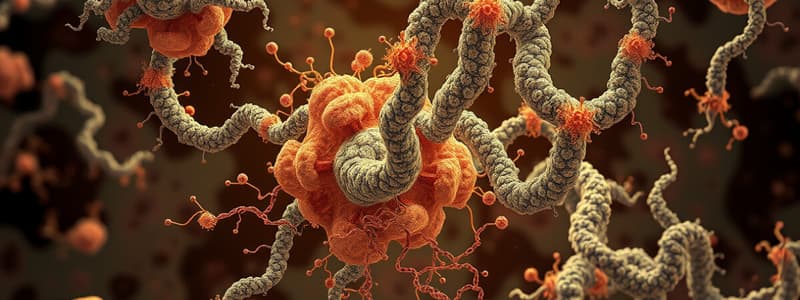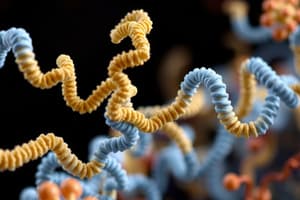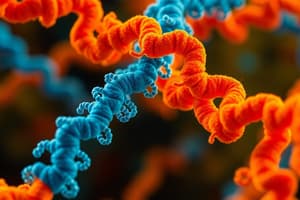Podcast
Questions and Answers
What is the primary role of proteins in the body?
What is the primary role of proteins in the body?
- They facilitate communication between cells.
- They are required for the structure, function, and regulation of tissues and organs. (correct)
- They store genetic information.
- They provide energy for cellular functions.
Which statement best describes the function of proteins in cells?
Which statement best describes the function of proteins in cells?
- Proteins serve only structural functions within the body.
- Proteins are the main energy source for cellular activities.
- Proteins primarily act as storage molecules.
- Proteins perform most of the work in cells. (correct)
In addition to structure, what other roles do proteins play in the body?
In addition to structure, what other roles do proteins play in the body?
- Proteins are involved in the regulation of tissues and organs. (correct)
- Proteins assist in energy production.
- Proteins regulate body temperature.
- Proteins are essential for communication between neurons.
Which of the following is NOT a function of proteins?
Which of the following is NOT a function of proteins?
Why are proteins considered crucial for cells?
Why are proteins considered crucial for cells?
What type of bond connects amino acids in a protein chain?
What type of bond connects amino acids in a protein chain?
Which group is present at the amino terminus of an amino acid?
Which group is present at the amino terminus of an amino acid?
What characterizes the carboxyl terminus of an amino acid?
What characterizes the carboxyl terminus of an amino acid?
How many peptide bonds can each amino acid in a chain typically make?
How many peptide bonds can each amino acid in a chain typically make?
Which of the following statements is false regarding amino acids in a chain?
Which of the following statements is false regarding amino acids in a chain?
What do hydrogen bonds form between in a peptide bond?
What do hydrogen bonds form between in a peptide bond?
How many amino acids are present in one full turn of a helical structure?
How many amino acids are present in one full turn of a helical structure?
Which interaction is critical for stabilizing the secondary structure of proteins?
Which interaction is critical for stabilizing the secondary structure of proteins?
What is the significance of the number 3.6 in the context of amino acids and helical structure?
What is the significance of the number 3.6 in the context of amino acids and helical structure?
Which statement about hydrogen bonds in proteins is false?
Which statement about hydrogen bonds in proteins is false?
What type of bond is formed between the amino group and the carboxyl group of amino acids?
What type of bond is formed between the amino group and the carboxyl group of amino acids?
Which of the following is a characteristic of a peptide bond?
Which of the following is a characteristic of a peptide bond?
Which of the following is NOT directly involved in the formation of peptide bonds?
Which of the following is NOT directly involved in the formation of peptide bonds?
What happens during the formation of a peptide bond?
What happens during the formation of a peptide bond?
Which functional groups are involved in the formation of peptide bonds?
Which functional groups are involved in the formation of peptide bonds?
What is the primary characteristic of prion proteins in relation to normal brain tissues?
What is the primary characteristic of prion proteins in relation to normal brain tissues?
Which disease is associated with the presence of abnormal prion proteins?
Which disease is associated with the presence of abnormal prion proteins?
How do Alzheimer’s disease and prion diseases, such as Creutzfeldt-Jacob disease, primarily differ?
How do Alzheimer’s disease and prion diseases, such as Creutzfeldt-Jacob disease, primarily differ?
Which statement accurately reflects the relationship between normal brain tissues and prion proteins?
Which statement accurately reflects the relationship between normal brain tissues and prion proteins?
Which of the following diseases is primarily linked to the misfolding of proteins rather than amyloid plaques?
Which of the following diseases is primarily linked to the misfolding of proteins rather than amyloid plaques?
Study Notes
Overview of Proteins
- Proteins perform crucial functions in cells, essential for the structure, regulation, and operation of tissues and organs.
- They serve as enzymes, facilitating biochemical reactions by breaking down substrates.
Amino Acids and Peptide Bonds
- Amino acids are the building blocks of proteins, linked together by peptide bonds.
- Each amino acid consists of a central carbon atom connected to an amino group, a carboxylic group, a hydrogen atom, and a variable R group (side chain).
- A peptide bond (amide bond) forms between the amino and carboxyl groups of adjacent amino acids, with only one peptide bond being made per chain segment.
Structure of Peptides
- The ends of a peptide chain include the amino terminus (N-terminus) with a free amino group and the carboxyl terminus (C-terminus) with a free carboxylic group.
- In a standard alpha-helix secondary structure, there are approximately 3.6 amino acids per complete turn.
Diseases Related to Protein Misfolding
- Alzheimer's disease is characterized by the accumulation of misfolded proteins in the brain, leading to neurodegeneration.
- Creutzfeldt-Jakob disease results from abnormal prion proteins that induce misfolding in normal proteins within the brain.
Key Concepts Regarding Peptide Bonds
- A peptide bond forms between the amino (NH2) group of one amino acid and the carboxyl (COOH) group of another.
- Hydrogen bonds can occur between the carbonyl oxygen of one peptide bond and the amide hydrogen of another, contributing to protein secondary structure stability.
Studying That Suits You
Use AI to generate personalized quizzes and flashcards to suit your learning preferences.
Related Documents
Description
This quiz delves into the essential role of proteins in cellular function and their importance in maintaining the structure and regulation of tissues and organs. Test your knowledge on how proteins contribute to biological processes and the overall functioning of the body.




